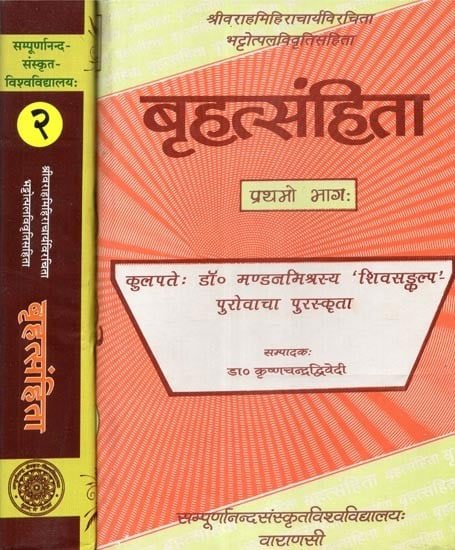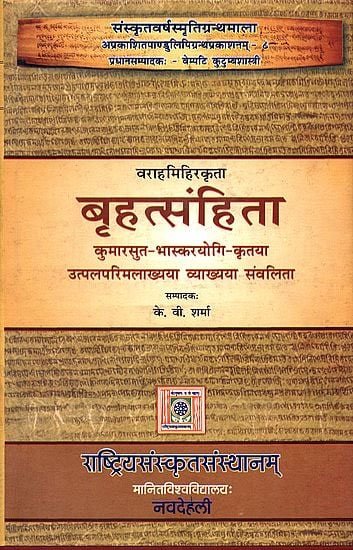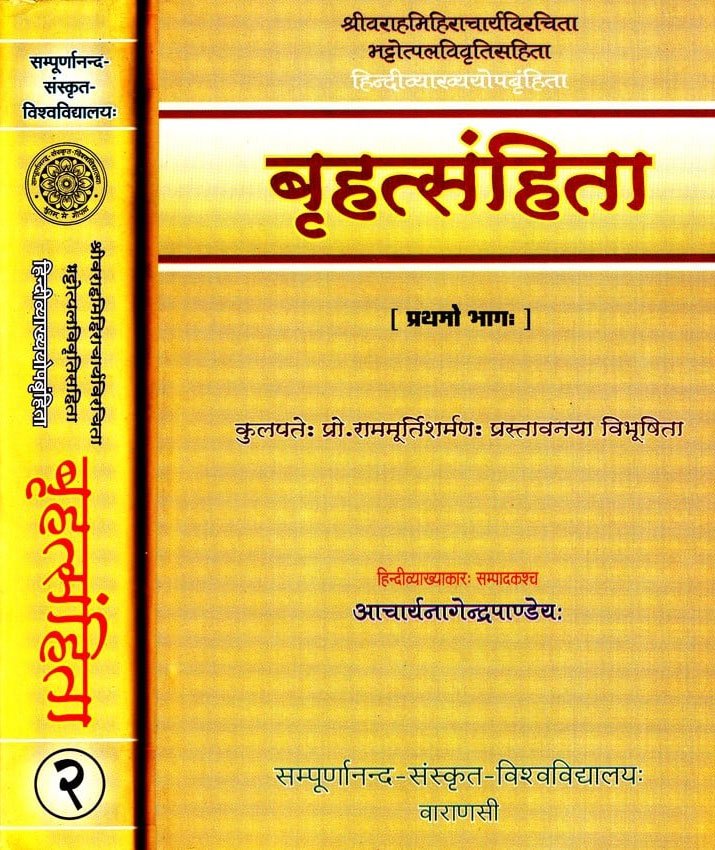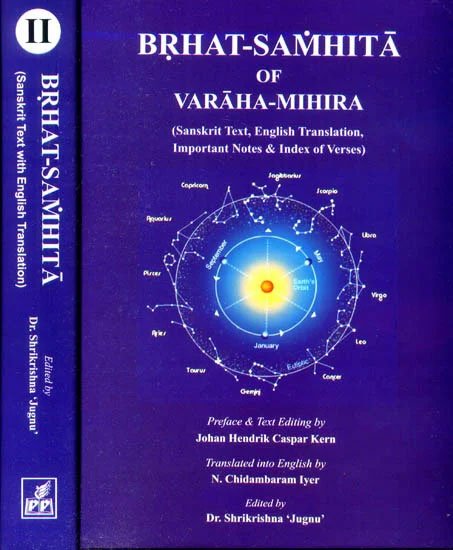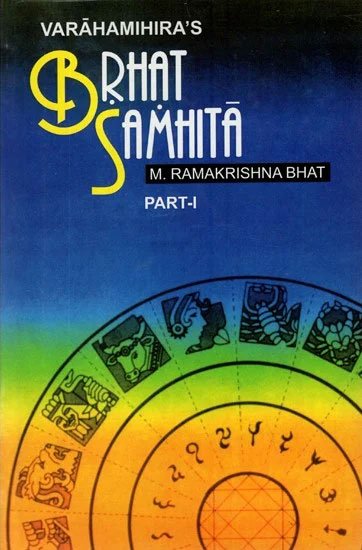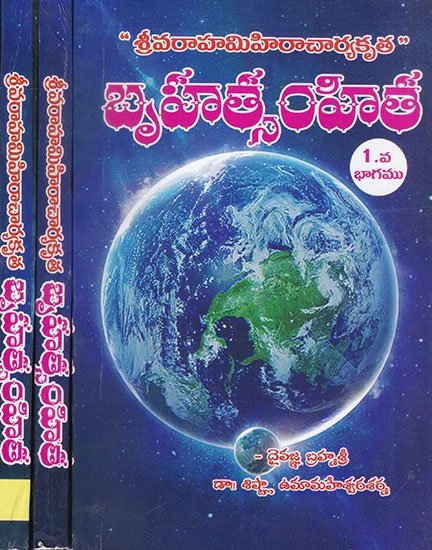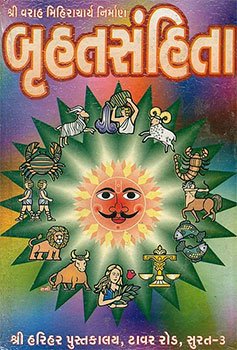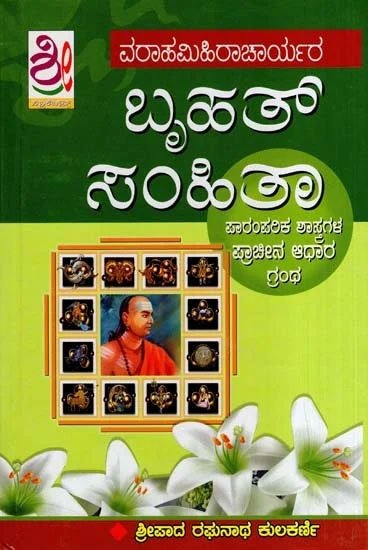Brihat-samhita [sanskrit]
26,560 words
The Sanskrit text of the Brihat-samhita from the 6th-century authored by Varaha Mihira in present-day Ujjain, India. It primarily deals with astrology and astronomy but is presented as an encyclopedia of knowledge.
Verse 99.5
कार्यं पौष्टिकमौषधादि शकुनौ मूलानि मन्त्रास्तथा गोकार्याणि चतुष्पदे द्विजपितृनुद्दिश्य राज्यानि च ।
नागे स्थावरदारुणानि हरणं दौर्भाग्यकर्माण्यतः किंस्तुघ्ने शुभमिष्टि पुष्टिकरणं मङ्गल्यसिद्धिक्रियाः ॥ ५ ॥
[इष्ट]
kāryaṃ pauṣṭikamauṣadhādi śakunau mūlāni mantrāstathā gokāryāṇi catuṣpade dvijapitṛnuddiśya rājyāni ca |
nāge sthāvaradāruṇāni haraṇaṃ daurbhāgyakarmāṇyataḥ kiṃstughne śubhamiṣṭi puṣṭikaraṇaṃ maṅgalyasiddhikriyāḥ || 5 ||
[iṣṭa]
The Sanskrit text of Verse 99.5 is contained in the book Brihata Samhita (Sanskrit Text with Hindi Translation) by Pandit Achyutananda Jha. This book is available online or you could buy the latest edition:
Read online Buy now! The Sanskrit text by Pandit Achyutananda Jha (2001)
Glossary of Sanskrit terms
Note: This extracts Sanskrit terms and links to English definitions from the glossary, based on an experimental segmentation of verse (99.5). Some terms could be superfluous while some might not be mentioned. Click on the word to show English definitions.
Karya, Paushtika, Aushadha, Shakuna, Shakuni, Mula, Mantra, Tatha, Goka, Arya, Aryani, Catushpad, Catushpada, Dvija, Nud, Dishya, Rajya, Naga, Sthavara, Daruna, Harana, Daurbhagya, Karman, Atah, Kimstughna, Shubha, Shubh, Ishtin, Ishti, Pushtikara, Mangali, Mangalya, Kriya,
Analysis of Sanskrit grammar
Note: this is an experimental feature and only shows the first possible analysis of the Sanskrit text (Verse 99.5). If the system was successful in segmenting the sentence, you will see of which words it is made up of, generally consisting of Nouns, Pronouns, Verbs, Participles and Indeclinables. Click on the link to show all possible derivations of the word.
- Line 1: “kāryaṃ pauṣṭikamauṣadhādi śakunau mūlāni mantrāstathā gokāryāṇi catuṣpade dvijapitṛnuddiśya rājyāni ca ”
- kāryam -
-
kārya (noun, masculine)[adverb], [accusative single]kārya (noun, neuter)[adverb], [nominative single], [accusative single]kāryā (noun, feminine)[adverb]√kṛ -> kārya (participle, masculine)[adverb from √kṛ]√kṛ -> kārya (participle, neuter)[adverb from √kṛ]√kṛ -> kāryā (participle, feminine)[adverb from √kṛ]√kṛ -> kārya (participle, masculine)[accusative single from √kṛ class 1 verb], [accusative single from √kṛ class 2 verb], [accusative single from √kṛ class 5 verb], [accusative single from √kṛ class 8 verb], [accusative single from √kṛ]√kṛ -> kārya (participle, neuter)[nominative single from √kṛ class 1 verb], [accusative single from √kṛ class 1 verb], [nominative single from √kṛ class 2 verb], [accusative single from √kṛ class 2 verb], [nominative single from √kṛ class 5 verb], [accusative single from √kṛ class 5 verb], [nominative single from √kṛ class 8 verb], [accusative single from √kṛ class 8 verb], [nominative single from √kṛ], [accusative single from √kṛ]√kṛ -> kārya (participle, masculine)[accusative single from √kṛ class 3 verb], [accusative single from √kṛ class 6 verb]√kṛ -> kārya (participle, neuter)[nominative single from √kṛ class 3 verb], [accusative single from √kṛ class 3 verb], [nominative single from √kṛ class 6 verb], [accusative single from √kṛ class 6 verb]√kṝ -> kārya (participle, masculine)[accusative single from √kṝ class 5 verb], [accusative single from √kṝ class 9 verb]√kṝ -> kārya (participle, neuter)[nominative single from √kṝ class 5 verb], [accusative single from √kṝ class 5 verb], [nominative single from √kṝ class 9 verb], [accusative single from √kṝ class 9 verb]
- pauṣṭikam -
-
pauṣṭika (noun, masculine)[adverb], [accusative single]pauṣṭika (noun, neuter)[adverb], [nominative single], [accusative single]
- auṣadhā -
-
auṣadha (noun, masculine)[compound], [vocative single]auṣadha (noun, neuter)[compound], [vocative single]
- adi -
-
ad (noun, masculine)[locative single]ad (noun, neuter)[locative single]
- śakunau -
-
śakuna (noun, masculine)[nominative dual], [vocative dual], [accusative dual]śakuni (noun, masculine)[locative single]
- mūlāni -
-
mūla (noun, neuter)[nominative plural], [vocative plural], [accusative plural]√mūl (verb class 1)[imperative active first single]
- mantrās -
-
mantra (noun, masculine)[nominative plural], [vocative plural]mantrā (noun, feminine)[nominative plural], [vocative plural], [accusative plural]
- tathā* -
-
tathā (noun, feminine)[nominative plural], [vocative plural], [accusative plural]tatha (noun, masculine)[nominative plural], [vocative plural]
- gokā -
-
gokā (noun, feminine)[nominative single]
- aryāṇi -
-
aryāṇī (noun, feminine)[adverb], [vocative single]arya (noun, neuter)[nominative plural], [vocative plural], [accusative plural]
- catuṣpade -
-
catuṣpad (noun, masculine)[dative single]catuṣpad (noun, neuter)[dative single]catuṣpada (noun, neuter)[nominative dual], [vocative dual], [accusative dual], [locative single]catuṣpadā (noun, feminine)[nominative dual], [vocative single], [vocative dual], [accusative dual]
- dvija -
-
dvija (noun, masculine)[compound], [vocative single]dvija (noun, neuter)[compound], [vocative single]
- pitṛ -
-
pitṛ (noun, masculine)[compound], [adverb]
- nud -
-
nud (noun, masculine)[compound], [adverb], [nominative single], [vocative single]nud (noun, neuter)[compound], [adverb], [nominative single], [vocative single], [accusative single]
- diśya -
-
diśya (noun, masculine)[compound], [vocative single]diśya (noun, neuter)[compound], [vocative single]√diś -> diśya (absolutive)[absolutive from √diś]√diś -> diśya (absolutive)[absolutive from √diś]
- rājyāni -
-
rājya (noun, neuter)[nominative plural], [vocative plural], [accusative plural]√rāj -> rājya (participle, neuter)[nominative plural from √rāj class 1 verb], [vocative plural from √rāj class 1 verb], [accusative plural from √rāj class 1 verb], [nominative plural from √rāj], [vocative plural from √rāj], [accusative plural from √rāj]
- ca -
-
ca (indeclinable conjunction)[indeclinable conjunction]ca (noun, masculine)[compound], [vocative single]ca (noun, neuter)[compound], [vocative single]
- Line 2: “nāge sthāvaradāruṇāni haraṇaṃ daurbhāgyakarmāṇyataḥ kiṃstughne śubhamiṣṭi puṣṭikaraṇaṃ maṅgalyasiddhikriyāḥ || 5 |”
- nāge -
-
nāga (noun, masculine)[locative single]nāga (noun, neuter)[nominative dual], [vocative dual], [accusative dual], [locative single]nāgā (noun, feminine)[nominative dual], [vocative single], [vocative dual], [accusative dual]
- sthāvara -
-
sthāvara (noun, masculine)[compound], [vocative single]sthāvara (noun, neuter)[compound], [vocative single]
- dāruṇāni -
-
dāruṇa (noun, neuter)[nominative plural], [vocative plural], [accusative plural]
- haraṇam -
-
haraṇa (noun, masculine)[adverb], [accusative single]haraṇa (noun, neuter)[adverb], [nominative single], [accusative single]haraṇā (noun, feminine)[adverb]
- daurbhāgya -
-
daurbhāgya (noun, neuter)[compound], [vocative single]
- karmāṇya -
-
karman (noun, neuter)[nominative plural], [vocative plural], [accusative plural]
- ataḥ -
-
ataḥ (indeclinable)[indeclinable]
- kiṃstughne -
-
kiṃstughna (noun, masculine)[locative single]kiṃstughna (noun, neuter)[nominative dual], [vocative dual], [accusative dual], [locative single]
- śubham -
-
śubha (noun, masculine)[adverb], [accusative single]śubha (noun, neuter)[adverb], [nominative single], [accusative single]śubhā (noun, feminine)[adverb]śubh (noun, feminine)[accusative single]
- iṣṭi -
-
iṣṭi (noun, feminine)[compound], [adverb]iṣṭin (noun, masculine)[compound], [adverb]iṣṭin (noun, neuter)[compound], [adverb], [nominative single], [vocative single], [accusative single]iṣṭī (noun, masculine)[adverb], [vocative single]iṣṭī (noun, feminine)[compound], [adverb], [vocative single]iṣṭī (noun, neuter)[compound], [adverb], [nominative single], [vocative single], [accusative single]
- puṣṭikara -
-
puṣṭikara (noun, masculine)[compound], [vocative single]puṣṭikara (noun, neuter)[compound], [vocative single]
- ṇam -
-
ṇa (noun, masculine)[adverb], [accusative single]
- maṅgalya -
-
maṅgalī (noun, feminine)[compound], [adverb], [nominative single], [vocative single]maṅgalya (noun, masculine)[compound], [vocative single]maṅgalya (noun, neuter)[compound], [vocative single]
- asiddhi -
-
asiddhi (noun, feminine)[compound], [adverb]
- kriyāḥ -
-
kriya (noun, masculine)[nominative plural], [vocative plural]kriyā (noun, feminine)[nominative plural], [vocative plural], [accusative plural]√kṛ (verb class 1)[benedictive active second single]√kṛ (verb class 2)[benedictive active second single]√kṛ (verb class 5)[benedictive active second single]√kṛ (verb class 8)[benedictive active second single]
- Cannot analyse 5
Other editions:
Also see the following editions of the Sanskrit text or (alternative) English translations of the Verse 99.5
Brhatsamhita with the Commentary of Bhattotpala
by Krishna Chandra Dwivedi (2016)
Publisher: Sampurnanand Sanskrit University; 1229 pages;
Buy now!
Brihat Samhita with the Commentary of Utpalapatimala of Yogisvara
by K. V. Sharma (2012)
Publisher: Rashtriya Sanskrit Sansthan, Janakpuri; 754 pages; ISBN-10; 8186111360; ISBN-13: 9788186111369
Buy now!
Brihat Samhita (Hindi Translation)
by K. V. Sharma (2002)
Publisher: Sampurnanand Sanskrit University; 2359 pages; ISBN-13: 9789387890008.
Buy now!
Brhat Samhita (English translation)
by N. Chidambaram Iyer (2022)
Publisher: Parimal Publication Pvt. Ltd.; 801 pages; Edited by Dr. Shrikrishna Jugnu; ISBN-10: 8171104215; ISBN-13: 9788171104215.
Buy now!
Brhat Samhita (English with notes)
by M. Ramakrishna Bhat (2010)
Publisher: Motilal Banarsidas Publishers Pvt. Ltd.; 1155 pages; ISBN-10: 8120810600; ISBN-13: 9788120810600.
Buy now!
Brhat Samhita (Telugu translation)
by Sishtla Umamaheswara Sharma (2020)
Publisher: Mohan Publications, Andhra Pradesh; 846 pages.
Buy now!Preview of verse 99.5 in Kannada sript:
ಕಾರ್ಯಂ ಪೌಷ್ಟಿಕಮೌಷಧಾದಿ ಶಕುನೌ ಮೂಲಾನಿ ಮನ್ತ್ರಾಸ್ತಥಾ ಗೋಕಾರ್ಯಾಣಿ ಚತುಷ್ಪದೇ ದ್ವಿಜಪಿತೃನುದ್ದಿಶ್ಯ ರಾಜ್ಯಾನಿ ಚ ।
ನಾಗೇ ಸ್ಥಾವರದಾರುಣಾನಿ ಹರಣಂ ದೌರ್ಭಾಗ್ಯಕರ್ಮಾಣ್ಯತಃ ಕಿಂಸ್ತುಘ್ನೇ ಶುಭಮಿಷ್ಟಿ ಪುಷ್ಟಿಕರಣಂ ಮಙ್ಗಲ್ಯಸಿದ್ಧಿಕ್ರಿಯಾಃ ॥ ೫ ॥
[ಇಷ್ಟ]
Brhat Samhita (Gujarati translation)
by - (2000)
Publisher: Shree Harihar Pustakalay, Surat; Author: Shri Varahamihira Acharya (શ્રી વરાહમિહીરાચાર્ય); 432 pages.
Buy now!Preview of verse 99.5 in Gujarati sript:
કાર્યં પૌષ્ટિકમૌષધાદિ શકુનૌ મૂલાનિ મન્ત્રાસ્તથા ગોકાર્યાણિ ચતુષ્પદે દ્વિજપિતૃનુદ્દિશ્ય રાજ્યાનિ ચ ।
નાગે સ્થાવરદારુણાનિ હરણં દૌર્ભાગ્યકર્માણ્યતઃ કિંસ્તુઘ્ને શુભમિષ્ટિ પુષ્ટિકરણં મઙ્ગલ્યસિદ્ધિક્રિયાઃ ॥ ૫ ॥
[ઇષ્ટ]
Brhat Samhita (Kannada translation)
by Sripada Raghunatha Kulkarni (2021)
Publisher: Srinidhi Publications, Bangalore; 668 pages with illustrations.
Buy now!Preview of verse 99.5 in Kannada sript:
ಕಾರ್ಯಂ ಪೌಷ್ಟಿಕಮೌಷಧಾದಿ ಶಕುನೌ ಮೂಲಾನಿ ಮನ್ತ್ರಾಸ್ತಥಾ ಗೋಕಾರ್ಯಾಣಿ ಚತುಷ್ಪದೇ ದ್ವಿಜಪಿತೃನುದ್ದಿಶ್ಯ ರಾಜ್ಯಾನಿ ಚ ।
ನಾಗೇ ಸ್ಥಾವರದಾರುಣಾನಿ ಹರಣಂ ದೌರ್ಭಾಗ್ಯಕರ್ಮಾಣ್ಯತಃ ಕಿಂಸ್ತುಘ್ನೇ ಶುಭಮಿಷ್ಟಿ ಪುಷ್ಟಿಕರಣಂ ಮಙ್ಗಲ್ಯಸಿದ್ಧಿಕ್ರಿಯಾಃ ॥ ೫ ॥
[ಇಷ್ಟ]
![Brihat-samhita [sanskrit] - book cover](/uploads/a/Brihat-Samhita-Sanskrit.jpg)
